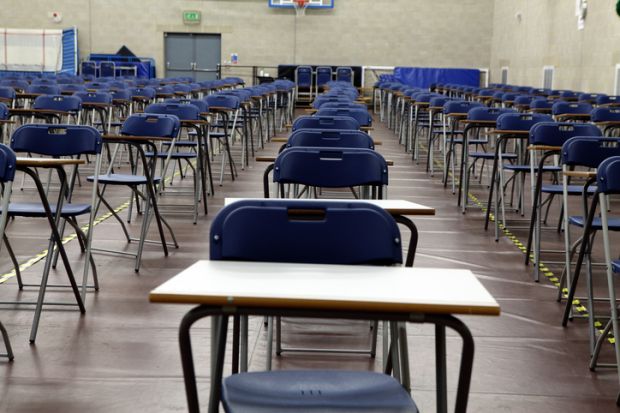Students from Asian backgrounds are twice as likely as their white contemporaries to be unhappy about the support received from their school following the coronavirus-linked cancellation of A-level exams, says a new study that is likely to increase concerns over the fairness of UK university admissions this summer.
Drawing on a survey of more than 500 students whose final A-level exams were cancelled due to the pandemic, the study found that just 42 per cent of Asian pupils were satisfied with how their school managed the crisis compared to 82 per cent of white pupils who were pleased with the assistance they received.
Sixty-seven per cent of black respondents were satisfied with their school’s performance regarding A levels, the results of which will be announced on 13 August.
With the cancellation of exams, A-level grades will be based on a student’s anticipated mark based on teachers’ predictions, as well as coursework, homework and previously taken exams.
These grades will then be standardised by Ofqual by comparing grade predictions against each school’s previous A-level results, meaning students may receive marks different from their predicted result.
Kalwant Bhopal, director of the Centre for Research in Race and Education at the University of Birmingham, who carried out the research with Martin Myers, from the University of Nottingham, said Asian students felt particularly aggrieved that they had been denied the chance to sit exams and potentially outperform their predicted grades.
“Some of the Asian students were quite high-achieving but felt they could do a lot better than they had been predicted,” explained Professor Bhopal, whose study also included Skype interviews with 53 students.
“One young Asian boy genuinely believed he could get 3 A*s but had only been predicted AAB, so felt he had been deprived of his chance to prove people wrong,” she said, adding: “Many pupils felt their A-level results would not be a fair reflection of their ability.”
Interviews with Asian students also highlighted how many Asian students attended low-performing schools and were unhappy about the guidance provided by teachers and school staff, added Professor Bhopal.
According to the survey, which was undertaken between April and July, 81 per cent of pupils from fee-paying independent schools were satisfied with how their school managed the crisis, but only 67 per cent of pupils in state comprehensive schools felt the same.
Overall, only one in five pupils (21 per cent) said they were happy not to sit their A-level exams, while more than twice this number (46 per cent) were unhappy about the situation, with 33 per cent of students undecided.
“Some people might be surprised at this finding, given the stress involved in sitting A-level exams, but many students were devastated by this because they had worked so hard to get to this point,” said Professor Bhopal, who added that many students feared their final marks would be dismissed as unearned and bogus.
“There was a strong fear that they would forever be seen as the ‘Covid generation’, whose marks were only ever estimated, not actually achieved,” said Professor Bhopal.
The study comes amid growing concern about the fairness of this week’s forthcoming A-level results following an outcry over “unfair” marks awarded in Scotland, where some 125,000 predicted marks were lowered by the country’s exam body, a quarter of all entries.
Some pupils claimed they were penalised because their school had historically not performed well.
Dr Myers, assistant professor in education at Nottingham, said the latest study “highlights a range of inequalities in the experiences of A-level students during the Covid-19 pandemic”.
“Many students felt the pandemic would exacerbate inequalities within schools, including those of race and ethnicity and those related to different types of schools,” said Dr Myers, who said candidates “felt that sitting exams was one way of proving their ability despite such inequalities and that this opportunity had been taken away from them”.
“They also often highlighted their fears that the pandemic would not only adversely affect their education but have long-term impacts on their mental health and well-being,” he said.
Register to continue
Why register?
- Registration is free and only takes a moment
- Once registered, you can read 3 articles a month
- Sign up for our newsletter
Subscribe
Or subscribe for unlimited access to:
- Unlimited access to news, views, insights & reviews
- Digital editions
- Digital access to THE’s university and college rankings analysis
Already registered or a current subscriber? Login








